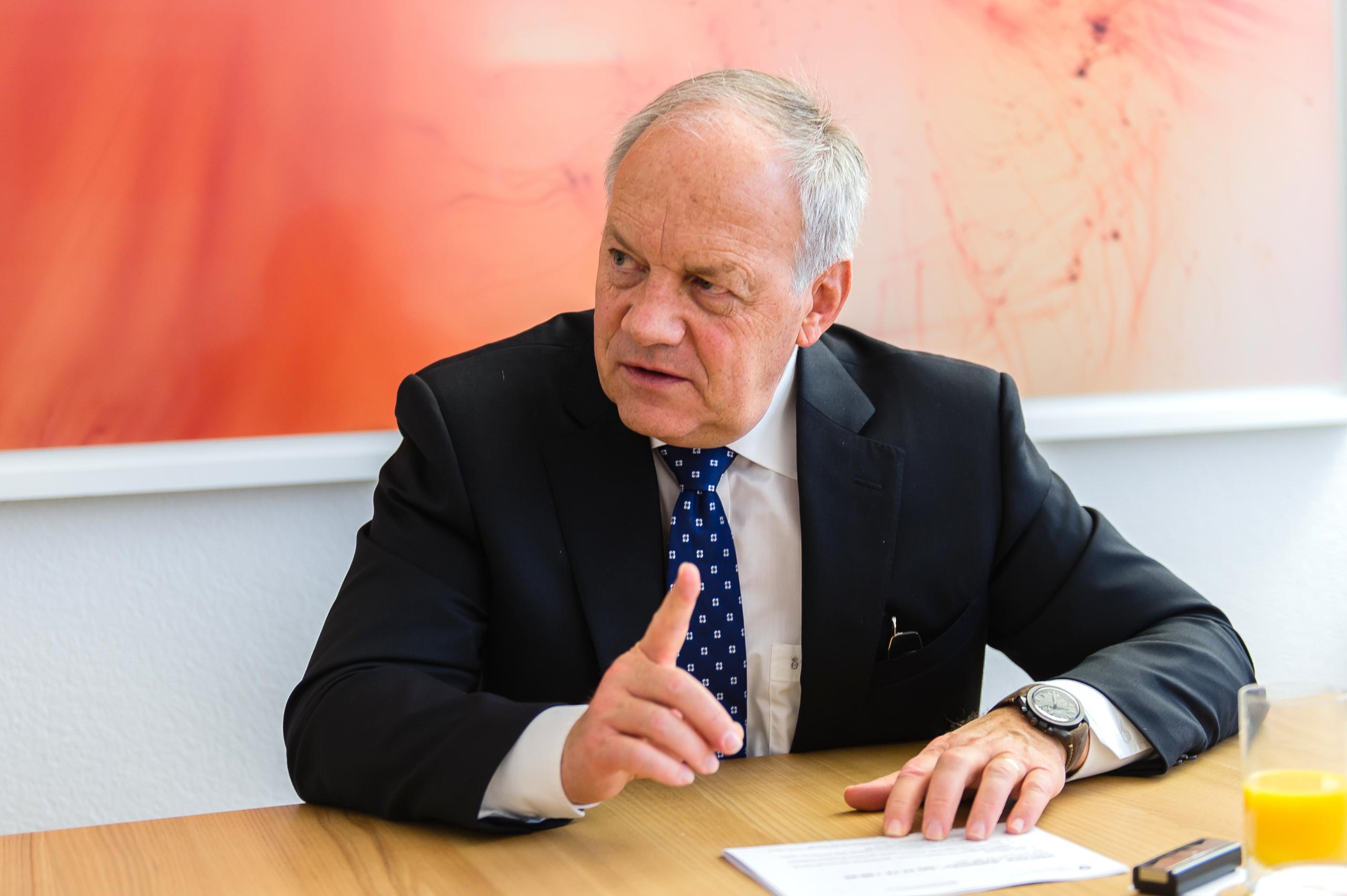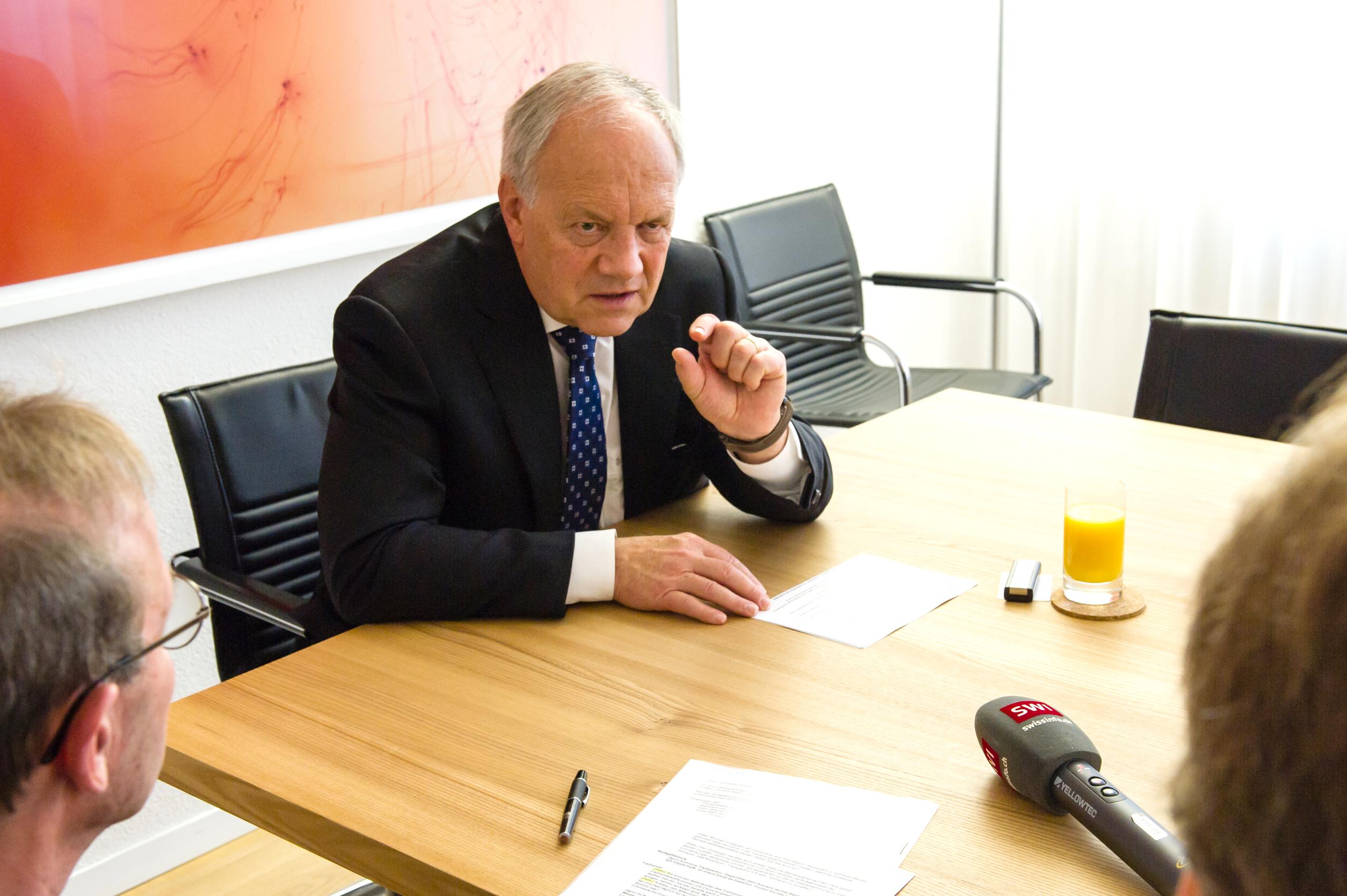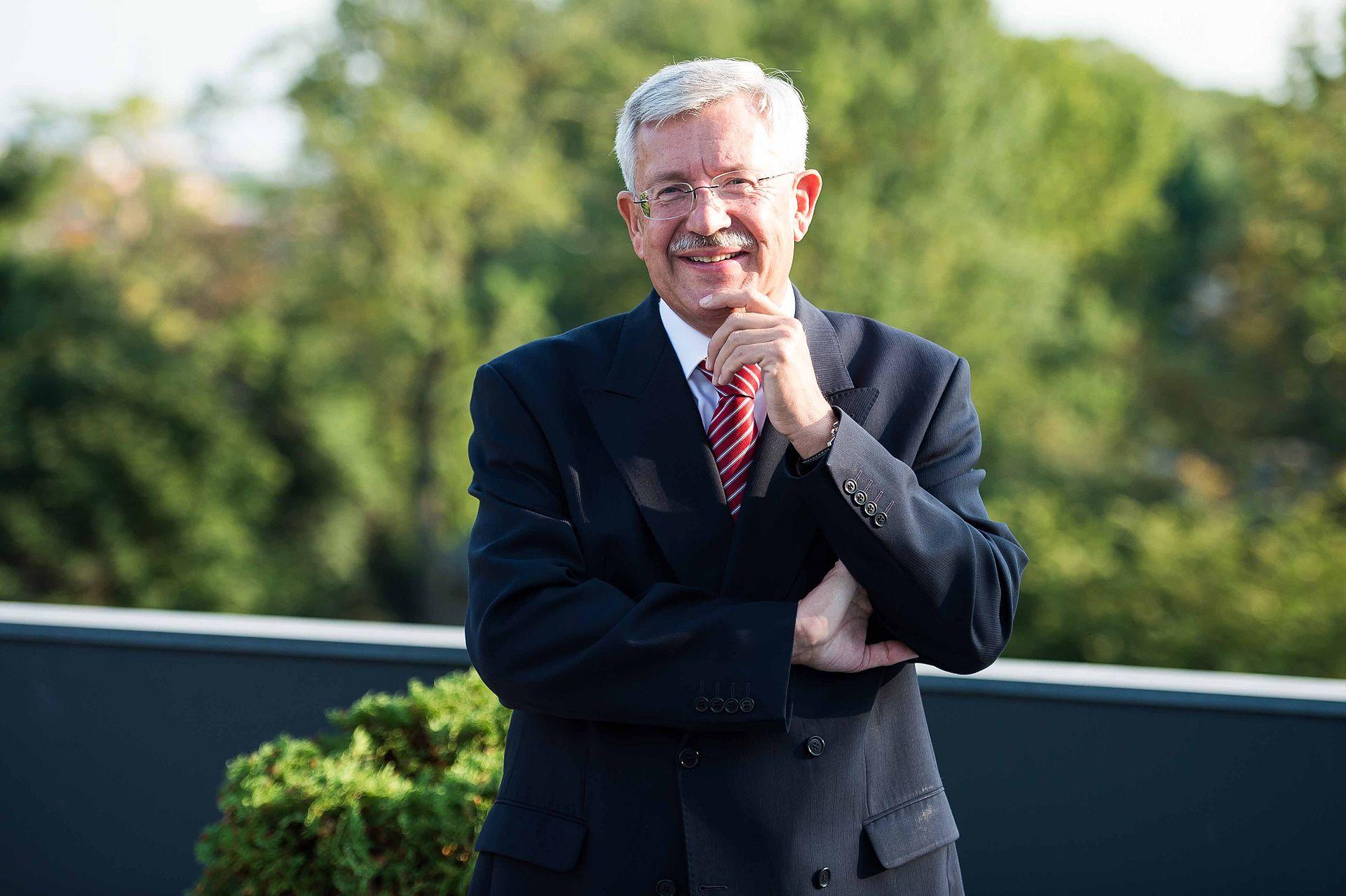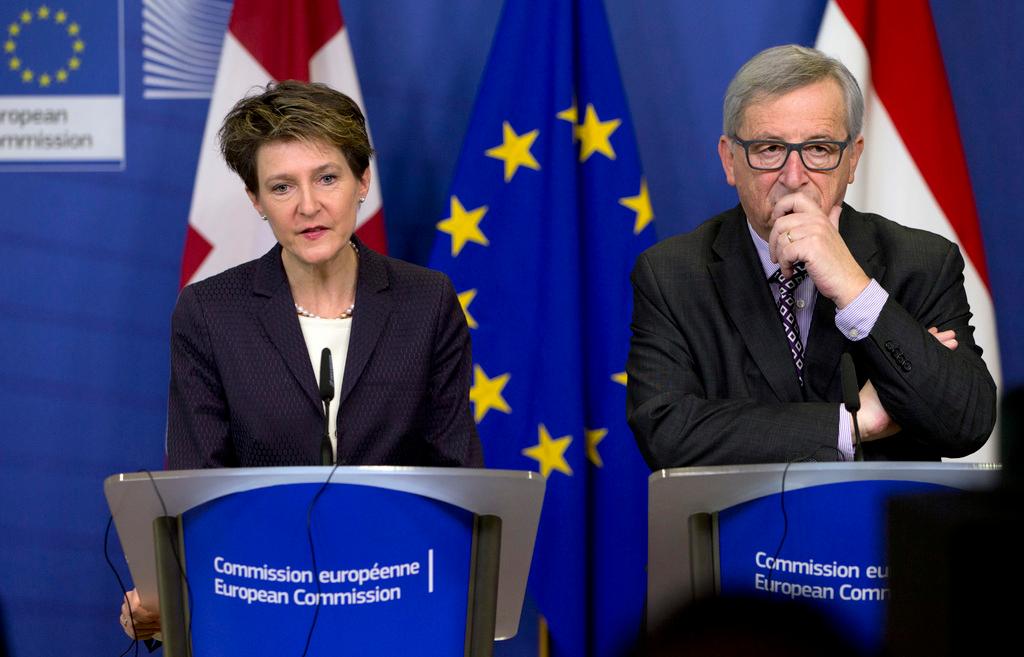Swiss president looks ahead to 2016

In his role as next Swiss president, Johann Schneider-Ammann says he will seek consensual solutions in order to “preserve Switzerland’s freedom, security and prosperity”. The former CEO of an industrial company, he believes Switzerland should be open to the world. He is also an advocate for the country’s sovereignty, including its system of direct democracy.
Schneider-Ammann isn’t the most gifted communicator, nor is he the country’s most popular minister. However, in December the Swiss parliament overwhelmingly elected him to hold the rotating one-year presidency. The Swiss economics minister, who is a member of the centre-right Radical Party, will preside over the Swiss government in 2016.
swissinfo.ch: Refugees and the security situation are big topics right now in Switzerland. Following the Paris attacks, the prevailing view is that terrorism has arrived on European soil. Does this apply to Switzerland as well?
Johann Schneider-Ammann: Mass migration is among the biggest challenges that Europe has faced since the Second World War. While terrorism in Europe isn’t new, the Paris attacks introduced a new dimension. We shouldn’t see a criminal behind every refugee. However, we should proceed with caution and pay close attention to who exactly is coming. In addition, those people who find protection in Switzerland for humanitarian reasons will be integrated and must respect our rules. And those who can’t stay, must go back.
swissinfo.ch: Another important topic for Switzerland is the country’s relationship to the European Union, especially in light of the initiative against mass immigration, which seeks to noticeably curb immigration. Will you follow through with the implementation of this initiative even if it destroys bilateral relations with the EU?
J.S.-A.: The Swiss cabinet has two objectives. First, we want to protect our bilateral relationship with the EU. Second, we will naturally respect the will of the people and limit immigration. We seek to achieve both goals through a safeguard clause.
Immigration will be curbed through this approach, and at the same time the basic principle behind the free movement of people as part of the first package of bilateral agreements will not be called into question.

swissinfo.ch: This is Switzerland’s argument, but does the EU hold the same view?
J.S.-A.: We will strive for a consensual solution with the EU. If this is not possible, however, Switzerland will unilaterally introduce the safeguard clause. I will reach out to European Commission President Jean-Claude Juncker at the beginning of the year. My predecessor, Simonetta Sommaruga, did an outstanding job of cultivating that relationship. I speak for Switzerland, not the EU.
swissinfo.ch: Switzerland wants to slow down immigration within a year via the safeguard clause even if no consensual solution can be reached. Won’t Switzerland put itself under pressure with this approach?
J.S.-A.: The Swiss cabinet has thought things through very carefully. However, it has received a constitutional mandate from the Swiss people, and we will thus implement it. In our country, the will of the people is respected and implemented.
swissinfo.ch: Even if the bilateral agreements are sacrificed?
J.S.-A.: We must strive to avoid this. We don’t know how the EU will react. What we do know is that the EU sees its relationship with Switzerland as something that is fundamentally good and valuable. Our trade relations are very intensive: CHF 1 billion ($1.01 billion) per day of work. The EU thereby achieves a trade surplus of €70 billion. The EU must therefore carefully consider whether it would be wise in light of employment issues to erect an economic barrier with Switzerland. It’s not realistic to assume that the EU would simply pull the plug.
swissinfo.ch: Segments of the Swiss economy are currently under pressure due to the strong Swiss franc. Thousands of jobs have been eliminated or moved abroad since the euro exchange rate ceiling was abolished at the beginning of last year. What action are you taking in your roles as the president and the Swiss economics minister to ensure that more positions aren’t transferred elsewhere?
J.S.-A.: Only monetary policy can alter the exchange rate. This is a matter for the Swiss National Bank.
In terms of economic policy, we did what we could in the short term. At the end of January, I already approved reduced working hours for companies that were hurting from the effects of the strong Swiss franc [where workers are compensated for work stoppages through unemployment insurance.] I will soon propose to the Swiss cabinet to extend the duration of the system from 12 months to 18 months. And the government has increased the budget of the Commission for Technology and Innovation by CHF20 million for the promotion of export-oriented small- and medium-sized companies. This is highly valued by the business community. We’re currently in the process of considering which measures should continue in 2016.
Apart from these measures, the most important thing is that we help ease the burden faced by companies, including by reducing bureaucracy and costs. We have to protect Switzerland as an industrial centre.
swissinfo.ch: Switzerland’s financial industry has also come under international pressure. Banking secrecy is as good as abolished as far as foreign clients go. However, it continues to exist for domestic clients. Do you believe this is appropriate?
J.S.-A.: In Switzerland, there is mutual trust between citizens and the state, and banking secrecy is based upon this. Citizens make a declaration, which is examined by the authorities. If it turns out that someone deliberately submitted false information, they’ll be punished accordingly. Whoever follows the rules, however, is entitled to the right of privacy in terms of not having the state poke around in their affairs.
swissinfo.ch: You’re a proponent of free trade, and were a strong supporter of the free trade agreements with China that came into force more than a year ago. Trade has increased significantly since then, despite the fact that there will only be a progressive elimination of tariffs, and it will take a few years to fully come to fruition. How can this increase be explained?
J.S.-A.: The free trade accords came into force on July 1, 2014. They’ve been in effect since then, even if not all the tariffs were immediately lowered. Following the conclusion of the technical negotiations in 2012, the Chinese sales market became much more interesting for our industry. A new tariff regime was on the horizon. This fuelled growth even before the agreement came into force.
The numbers for the first year are good. Switzerland’s global exports grew by 0.9%, and those to China rose by 2.3%. The free trade agreement is helping local companies protect jobs.
Swiss and Chinese authorities are working well together. If there’s something wrong, we can solve problems more efficiently. I hear how important this agreement is on a daily basis. We have an advantage over European competitors because they don’t have an agreement yet.
swissinfo.ch: The business community, in particular, applauded this strategic move. But it was also the target of criticism. For example, there were concerns that Switzerland would now tolerate human rights violations in China as a result of the agreement. What is your response to these concerns?
J.S.-A.: That’s not correct. In the agreement’s preamble, there is a reference to the charter of the United Nations, and it indirectly addresses the human rights question.
In the free trade agreement with China, we negotiated a separate chapter regarding environmental challenges, and we also signed an additional agreement that exclusively addresses social issues.
Transparency will increase as China is integrated more within the world trade system. As a result, there will be greater consideration of environmental and social issues.
A short biography
Johann Schneider-Ammann was born in 1952 in Sumiswald in Emmental. He studied electrical engineering at the Federal Institute of Technology in Zurich. In 1982/83, he received a Master of Business Administration degree from the Insead Business School in Fontainebleau, near Paris. He is married with two sons. In 1981, he joined the Langenthal-based industrial firm owned by his wife’s family. He headed the Ammann-Group from 1990 until he was elected to the Swiss cabinet in 2010. He also presided over the Swiss mechanical and electrical engineering association Swissmem.
swissinfo.ch: China is a significant market. However, aside from the European market, the United States market is even more important. Washington and EU are on the verge of reaching a free trade agreement (TTIP). Will Switzerland be left behind?
J.S.-A.: There’s still a chance that TTIP will be implemented while President Obama is in office. We’re making a major effort to remain close to negotiations, so that we can react quickly at the right moment. In 2012 we received a commitment from the US Trade Representative to keep us updated. I’ve met with him several times since, most recently this past summer in Washington. It has been repeatedly made clear to us that as soon as the agreement with the EU is in place, we can latch on. But we can’t negotiate new items. “It’s take it or leave it.”
I have a motto, and it’s not only for the year in which I serve as president. “United for jobs and our country.” I would like full employment in Switzerland so that everyone has a future. We continue to work in the background to make sure that we aren’t left behind when TIPP comes into force.
Translated from German by Catherine McLean

In compliance with the JTI standards
More: SWI swissinfo.ch certified by the Journalism Trust Initiative














You can find an overview of ongoing debates with our journalists here . Please join us!
If you want to start a conversation about a topic raised in this article or want to report factual errors, email us at english@swissinfo.ch.